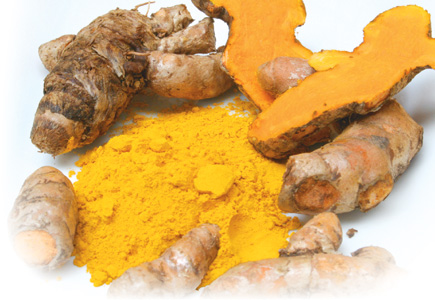THE TURMERIC: WHAT PROPERTY ?
Supplements Turmeric

Turmeric belongs to a genus of plants belonging to the family Zingiberaceae, including 80 known species, used in food and medicinal purposes. Curcuma longa or saffron Indies (referred to as turmeric without further clarification) is characterized by a lively yellow root pulverized. Turmeric has long leaves, oval and petiolate, while the flowers are collected in spikes oblong. Distributed throughout South Asia, it is now cultivated in most tropical regions. It needs an ambient temperature of between 20 and 30 ° C, as well as a considerable amount of precipitation.
The most important components of turmeric are part of a group called curcuminoids, which include: curcumin (diferuloylmethane), the demetoxicurcumina and bisdemetoxicurcumina. The most studied is curcumin, which is on average 3.14% of the powder.
In India, turmeric has long been used as a remedy for disorders of the stomach and liver, as well as care for topical use to heal wounds on its supposed ability antimicrobial.
Turmeric counts with numerous beneficial properties:
The best known and proven are choleretic-cholagogue, which promote the production of bile and its flow in the gut; turmeric can thus improve liver health, help eliminate excess cholesterol and aid digestion of meals and high in fat. Turmeric is also useful in the treatment of dyspepsia (indigestion), bloating and flatulence.
It also has anti-inflammatory, antiviral, antibacterial, antifungal and anti-oxidants. Curcumin has proved potentially useful in the treatment and prevention of many diseases and symptoms outbuildings, including Alzheimer's disease, AIDS, arthritis, diabetes, and several cancers.
Supplements Turmeric
